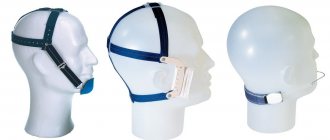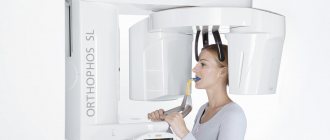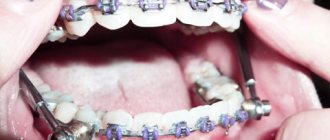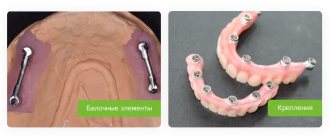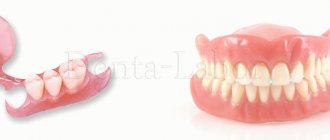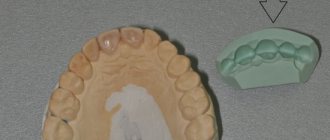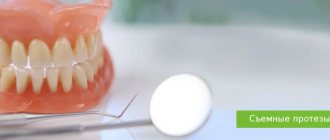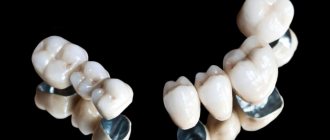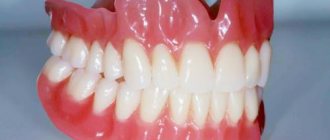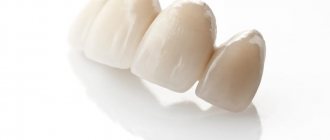From this article you will learn:
- removable silicone dentures – reviews from dentists,
- main characteristics, pros and cons,
- price for 2022 in Moscow.
Silicone dentures are sometimes referred to by patients as types of removable dentures that have a certain degree of flexibility and elasticity (unlike traditional dentures made of acrylic plastic). In fact, this type of removable dental prosthetics has nothing to do with silicone, but “silicone dentures” are made from other elastic materials - either nylon or AcryFree material.
The main advantage of prostheses made from these materials is their stunning aesthetics, and it is not for nothing that they are called “invisible prostheses.” The denture base is made of nylon or AcryFree - can be of different shades of pink, and can also be made with a certain degree of transparency if desired. Thanks to this, the prosthesis practically merges with the surrounding mucous membrane (Fig. 1-3). In the dental laboratory, sets of plastic teeth are inserted into the elastic base and, thus, the prosthesis takes on a finished appearance.
Silicone prostheses: before and after photos
Content:
- Features and types of silicone teeth
- Who are they suitable for?
- Contraindications
- Advantages
- Flaws
- Manufacturing and installation
- How to extend product life
Silicone dentures are often used in dental practice.
With the help of these structures, it is possible to restore one or several damaged teeth at once. The systems are made according to individual impressions and are relatively inexpensive. Of course, they cannot be called the best solution for any clinical case of edentia, but doctors are often faced with situations where silicone structures are preferable.
Stock
-13%
Metal-free dental crown made of zirconium dioxide 40,000 rub.
35,000 rub.
get -30 %
Dental implantation RUB 35,000.
50000 rub. 35,000 rub.
get -27 %
Teeth in 1 day on Straumann implants using ProArch technology!
300,000 rub. 220,000 rub.
get -20 %
Manufacturing of removable denture Acry Free 40,000 rub.
32,000 rub. get
Features and types of silicone teeth
Restoring devices of the described type are always removable. They are suitable for partial and complete dentures. They are made of flexible and deformation-resistant material - nylon or Acry-free.
That is, silicone as such is not used in their production. The products were called silicone only because they outwardly resemble this frozen composition.
Soft devices have appeared in the field of prosthetics thanks to the introduction of innovative technologies for injection molding of polymers and medical plastics. To create them, specialists use high temperatures. It is through step-by-step heat treatment that the final product acquires the required degree of elasticity and strength.
Here are the names of the thermoplastics from which silicone devices are made:
- Nylon. Known to dentists for almost two decades. Very flexible material. Cheap solution for prosthetics.
- Acry-free (plastic without monomers). In addition to a soft base, Acry-free devices are equipped with a semi-rigid base. They are not as flexible as nylon, but last longer and wear better. Put less pressure on the gums.
According to the criterion of the number of missing teeth, silicone dentures are:
- Single. They are held in the dentition by special hooks - clasps. Only one tooth is replaced. They are placed if for some reason it is impossible to carry out prosthetics with fixed systems or implantation right now.
- Partial. Indicated if two or more adjacent teeth are missing. They are also kept in the mouth thanks to clasps.
- Full. Suitable for people with complete edentia (that is, when the dentition is completely empty). Can replace the upper or lower jaw. For high-quality fixation, they are “set” on special gels or creams that act as glue and do not allow food debris to get under the base.
Which material is better to choose, alternatives
Often a person cannot decide which prosthesis is better to choose - plastic or silicone (here we mean, of course, flexible). Let's figure it out. Plastic or plastic are popular “middle” names for acrylic prosthetic structures. That is, we will compare rigid and flexible products (although, in fact, almost all of them contain polymers, i.e. plastic). Hard ones are very durable, distribute pressure well, but can rub the mucous membrane2 and provoke its irritation. On the other hand, hard acrylic ones with compact dimensions (without a palate) can be fixed on implants - and this is the most reliable method of tooth restoration today. They can be called the best alternative to flexible removable dentures.
Flexible ones are also quite durable and do not rub your gums at first. But when the bone sag (and it will sag over time to one degree or another for everyone), then the flexible one will become uncomfortable and will rub. It can also stretch, and not all materials can be repaired. Elastic structures are not placed on implants.
REPROSTHETOSIS WITH ACRYLIC PROSTHETICS - RUB 180,000!
Re-prosthetics with an acrylic bridge on a metal frame (all included) up to 12 units.
Call now or request a call
Therefore, any removable options are recommended only as a temporary solution (especially nylon, which was created specifically for temporary wearing), or if there are significant contraindications to implantation. Otherwise, the choice depends on the clinical situation and the wishes of the patient - Acry-free or polyurethane for complete adentia, and Quattro Ti is the optimal solution for partial adentia.
Who are they suitable for?
Indications for the manufacture of silicone dentures are as follows:
- partial/complete adentia in adults;
- individual intolerance to removable acrylic dentures and impossibility of implantation;
- premature destruction of baby teeth in children.
Silicone devices are suitable for people who engage in extreme sports or have diseases of the pancreas or cardiovascular system. They do not oxidize and do not harm internal organs.
Classification of flexible structures
“Silicone”, or rather flexible products, are only removable. They are not made permanent. Let's consider the classification from the point of view of the length of the structure - i.e. how many teeth do they replace:
- single or “butterfly dentures”: replace 1-2 missing teeth, attached to adjacent teeth using clasps,
- partial: replace several missing teeth, incl. in different parts of the row. Attached with hooks to living teeth,
- full: worn with complete edentia, i.e. with complete absence of teeth. They are fixed only to the gums.
Advantages
A silicone dental prosthesis can easily be called a highly aesthetic dental device. It is practically invisible to others and makes the smile full and harmonious. Its flexible base is completely transparent or has a shade that matches the gum tissue. Other advantages of these devices include:
- Minimum weight, small volume. Thanks to these features, it is easier to get used to the prosthesis. It does not cause a feeling of heaviness in the chin area.
- Possibility to keep adjacent teeth intact. There is no need to grind them down to secure the structure. Modern clasps, made of a translucent base, are not visible when laughing and talking.
- Reliability. The retention systems of silicone prostheses are durable. Under no circumstances will they fall out of your mouth.
- Health safety. Modern flexible systems do not include monomers - compounds that often cause an individual intolerance reaction. Therefore, they can be safely used even by people prone to allergies to medical alloys and materials.
Acry-Free prostheses
Such prostheses are made from a completely new monomer-free material, Bio Acry Free. Unlike silicone (nylon) and acrylic structures, they have great advantages when worn and a minimum of contraindications.
Their main advantage is the ability to repair if the structure breaks down and a more uniform distribution of the chewing load, thanks to a slightly more rigid base compared to nylon. In addition, dentures made from Acre Free are much easier to polish than other structures. This means that plaque practically does not accumulate on them, which, however, does not negate the full care of the structure.
Flaws
Speaking about the disadvantages of silicone prosthetic structures, dentists focus patients’ attention on:
- the risk of severe rubbing of the mucous membranes with clasps;
- gradual subsidence of the gums and its pronounced atrophy (with removable prosthetics, the proper chewing load is not applied to the bone tissue);
- difficulties with adaptation (at first there may be problems with diction, increased salivation);
- the need for periodic visits to the dental office for professional cleaning of the device (if you do not care for it properly, scratches and pores will appear in which pathogenic microorganisms will begin to actively multiply):
- short service life (usually every three to five years it is necessary to make a new prosthesis, since the previous one becomes irreparable).
We should not forget that silicone prostheses are soft. Due to the chewing load, they sag in certain places. Since artificial teeth are only imitation and do not have roots, the necessary stimulation of the jawbone does not occur. Therefore, in the place over which the prosthesis stands, the bone begins to dissolve. His blood supply is deteriorating. This negatively affects the health of the oral cavity and can become a serious obstacle to further prosthetics.
Doctors do not recommend wearing silicone prostheses for a long time. Still, it makes more sense to restore missing teeth with implants.
A few simple rules for cleaning dental plaque from dentures
- The best remedy that dentistry offers today are special tablets. These are oxygen-containing substances that actively affect plaque and food debris. They are very easy to use: just put the tablet in a container with water, put the prosthesis there overnight and leave it for oxygen exposure. In the morning you will receive a completely clean and pleasantly smelling prosthetic device.
- When brushing traditionally with a toothbrush, it is recommended not to use toothpastes with abrasives. This is because the soft tissue of the silicone prosthesis can be scratched or damaged. It is advisable to choose a toothbrush with soft bristles. Children's toothpastes or liquid dish soap are excellent cleaning agents.
- Silicone dentures, just like healthy teeth, need to be cleaned in hard-to-reach areas. To do this, you can use dental floss or special dental irrigators. If there are places in the denture that you cannot reach, then dental hygienists can help you. Daily use of a silicone denture requires regular visits to the dentist for effective hygiene and necessary adjustments.
The LeaderStom dental clinic offers you to use our services and the services of our doctors. The high level of qualifications of specialists allows us to recommend to patients the most optimal and affordable types of dental structures. We use only high-quality drugs and materials from well-known global manufacturers. Tested and certified products guarantee that you will be able to use a silicone prosthesis for a sufficiently long time. Make an appointment, and at the first consultation we will decide which prosthesis option will be best for you.
Manufacturing and installation
Silicone dentures are produced in several stages. First, the doctor examines the patient’s oral cavity and takes a medical history. If during the examination any dental diseases are revealed (caries, pulpitis, gingivitis, periodontal disease, abnormal abrasion of enamel, etc.), be sure to treat them.
The next step is professional hygiene. An ultrasonic scaler cleans enamel from soft plaque and tartar. This creates conditions for maintaining healthy microflora in the mouth.
When the preparatory activities come to an end, the doctor takes impressions of the upper and lower jaws. Based on them, a plaster model is made in the laboratory. During the fitting process, the imperfections of the future system are revealed. They are eliminated. Based on the approved blank, a silicone device is produced.
On the appointed day, the patient comes to the dental clinic, where he is put on a new device for the first time. The doctor explains in detail how to use it correctly and what daily care should be.
Comments
Tell me, do I need to grind my teeth to install silicone dentures? I am looking for a temporary version of the prosthesis, because... I’m missing one tooth and I still can’t decide what’s better to put in next – a bridge or an implant.
Oleg (08/09/2019 at 17:28) Reply to comment
- Dear Oleg! To install silicone dentures, you do not need to grind down the supporting teeth; soft silicone hooks will simply tightly grasp them and hold the structure in the mouth. If you are still deciding which type of permanent prosthetics to choose, then silicone temporary removable devices are what is right for you. As for what is better to install later - an implant or a bridge - we will give you advice: in terms of price, both of these solutions today will be approximately equal, but in terms of quality and durability, implantation wins. The fact is that when installing a bridge, you will have to grind down two supporting teeth and depulpate them; they will bear a colossal load, which will lead to their rapid destruction. The big disadvantage of the bridge is that after removal the patient has to restore not 1, but 2-3 teeth. The implant works independently, without having a destructive effect on neighboring units, and if it is installed well, it will last a lifetime.
Editorial staff of the portal UltraSmile.ru (08/12/2019 at 10:13 am) Reply to comment
Write your comment Cancel reply
How to extend product life
The material from which the prosthesis is made is not painted with food dyes and does not absorb unpleasant odors. The system must be cleaned with a regular brush and paste without abrasive particles. It is better to store it at night in a special container with a disinfectant solution. If you don't have one, a regular glass will do.
Do not wash nylon devices with hot water or rub vigorously. They should not be stored dry. Before putting them on, you should brush the inside of your cheeks and tongue with a soft brush every morning.
If the device is broken, it is unacceptable to repair it yourself. It is recommended to immediately visit a dental laboratory specialist. If you wear a denture with a crack, you may develop oral diseases. The appearance of chronic inflammatory foci cannot be ruled out, which is bad for health.
What can you say about the cons?
Flexible orthopedic structures have many more disadvantages than advantages. Let's take a closer look at their disadvantages:
- the likelihood of displacement and falling out of the mouth: it is elasticity that leads to the fact that chewing pressure is not very correctly redistributed to the jaw bone, so inconvenience may occur when eating,
- damage to supporting teeth: they are overloaded and fail faster,
- gum injuries from the pressure of clasps,
- discomfort: full dentures with a massive palate can cause nausea, prevent you from tasting food, lead to excessive salivation,
- need for adaptation: getting used to removable ones, even if they are small, quite long - at least 7-10 days,
- the risk of irreversible changes in the properties of the material: excessive stretching of the base as a result of active use (applies mostly to nylon) will lead to the fact that the prosthesis will have to be changed before the declared “shelf life” expires,
- increased adhesion of food to the nylon base: the inner part is rough and, as hygiene deteriorates, it becomes a place for the accumulation of microbes that provoke inflammation.
Reviews
If you use this type of prosthesis, are thinking about installing it, or have other information about them verified by your own experience, then we will be glad to see your feedback and additions to the article in the comments.
If you find an error, please select a piece of text and press Ctrl+Enter.
Tags dentures removable dentures
Did you like the article? stay tuned
Previous article
Unique Procera technology from Nobel Biocare
Next article
What does a patient need to know before undergoing dental implantation under anesthesia?
Prices for removable dentures in 2022
Many dentists in Kaluga offer their services for removable dentures. Prices vary greatly, but you can always find a clinic with reasonable prices and good quality.
Table 2. Prices for dentures
| Material | Partial denture | Complete denture |
| Plastic | from 10,000 rub. | 17,000 – 18,000 rub. |
| Acrylic | from 12,000 rub. | 20,000 – 23,000 rub. |
| Nylon | from 20,000 rub. | 40,000 – 45,000 rub. |
| Acry free | from 35,000 rub. | 65,000 – 70,000 rub. |
| Spofadent | from 16,000 rub. | 20,000 – 25,000 rub. |
| Ivobase | from 30,000 rub. | 55,000 – 60,000 rub. |
| Vertex | from 28,000 rub. | 45,000 – 50,000 rub. |
| Deflex | from 20,000 rub. | 45,000 – 50,000 rub. |
| Clasp prosthesis | 40,000 – 70,000 rub. | — |
| Immediate | 18,000 – 20,000 rub. | 30,000 – 40,000 rub. |
| On implants | — | 90,000 – 120,000 rub. |
You can familiarize yourself in detail with the price list of the dental clinic “Albadent” in Kalugana page (CLICK ON THE LINK)
